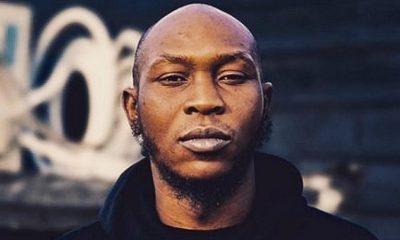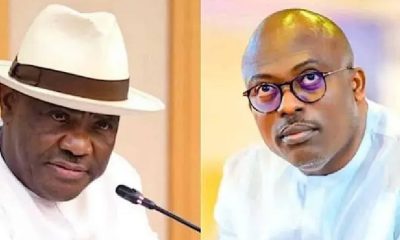Economy
Nigeria’s FX reserves drop to $32bn, lowest in six years

Nigeria’s foreign reserves fell to $32.29 billion on April 15, the lowest in over six years.
According to the latest data from the Central Bank of Nigeria, CBN, the reserves moved from $34.44 billion, the highest level in 2024, to $32.2 billion on April 15.
The foreign reserves dropped by $2.15 billion or 6.26 per cent.
This brings to an end, a period of steady increase between February 5 and March 18, when the FX reserves rose by $1.28 billion.
CBN had attributed the growth to increased remittance payments from Nigerians abroad and heightened interest from foreign investors in local assets, including government debt securities.
The last time the foreign reserves stood at this level ($32.29 billion) was on September 9, 2017, when the CBN reported N32.28 billion.
The decline in foreign reserves comes amid CBN’s intervention in the parallel market in a bid to crash the FX rate.
On February 27, the apex bank allocated $20,000 to each bureau de change (BDC) operator at the rate of N1,301/$, while the second tranche of $10,000 was sold to the BDCs at the rate of N1,251/$.
On April 8, the apex bank began the third tranche of sales to BDCs at N1,101/$.
Amid this intervention, the naira appreciated against the dollar in the parallel market, moving from N1,900 per dollar on February 21, to N1,100/$ on April 13.
Economy
75.5% of rural Nigerians now live below poverty line — World Bank

The World Bank has disclosed that a staggering 75.5 per cent of rural Nigerians are now living below the poverty line, reflecting deepening hardship in the country’s hinterlands.
This was revealed in the Bank’s April 2025 Poverty and Equity Brief for Nigeria, which paints a grim picture of worsening economic hardship, widening inequality, and persistent underdevelopment across much of the nation.
While poverty is widespread among urban populations, the report emphasised that the situation is significantly worse in rural areas, where economic stagnation, high inflation, and insecurity have exacerbated living conditions.
“Based on the most recent official household survey data from Nigeria’s National Bureau of Statistics, 30.9 per cent of Nigerians lived below the international extreme poverty line of $2.15 per person per day in 2018/19 before the COVID-19 pandemic,” the report stated.
The report also highlighted Nigeria’s enduring regional disparities. “Nigeria remains spatially unequal. The poverty rate in northern geopolitical zones was 46.5 per cent in 2018/19, compared with 13.5 per cent for southern ones. Inequality measured by the Gini index was estimated at 35.1 in 2018/19.
“Nigeria’s Prosperity Gap — the average factor by which individuals’ incomes must be multiplied to attain a prosperity standard of $25 per day for all — is estimated at 10.2, higher than most peers.”
Despite successive policy interventions, these figures underscore a persistent economic divide across the country.
The report’s demographic analysis found that children aged 0 to 14 years had a poverty rate of 72.5 per cent, reflecting the scale of deprivation among the youngest segment of the population.
Gender disparities were also observed, with 63.9 per cent of females and 63.1 per cent of males classified as poor under the $3.65 per day lower-middle-income threshold.
Education emerged as a significant determinant of poverty, with Nigerians lacking formal education experiencing a poverty rate of 79.5 per cent. This contrasts with 61.9 per cent for those with primary education and 50.0 per cent for secondary school graduates. Only 25.4 per cent of those with tertiary education were considered poor.
The report also drew attention to multidimensional poverty indicators, which further reflect widespread deprivation.
According to the World Bank, about 30.9 per cent of Nigerians live on less than $2.15 daily, 32.6 per cent lack access to limited-standard drinking water, 45.1 per cent do not have limited-standard sanitation, and 39.4 per cent have no electricity.
Education access remains a challenge, with 17.6 per cent of adults yet to complete primary education, and 9.0 per cent of households reporting at least one school-aged child not enrolled in school.
The report noted that even before the COVID-19 pandemic, efforts to reduce extreme poverty had largely stalled.
“Before COVID-19, extreme poverty reduction had almost stagnated, dropping by only half a percentage point annually since 2010. Living standards of the urban poor are hardly improving, and jobs that would allow households to escape poverty are lacking,” the report read.
Although the World Bank acknowledged recent economic reforms aimed at stabilising Nigeria’s macroeconomic outlook, it warned that persistently high inflation continues to undermine household purchasing power, particularly in urban areas where incomes have not kept pace with rising costs.
In light of the worsening situation, the Bank called for urgent policy action to shield vulnerable groups from inflationary shocks and to drive job creation through more productive economic activities.
Economy
Naira Records Marginal Decline Against Dollar at Official Market

The Nigerian naira experienced a mild drop in value on Friday, closing at ₦1,602.18 per dollar in the official foreign exchange market, based on figures released by the Central Bank of Nigeria (CBN).
This marks a decrease of ₦5.49 from the rate of ₦1,596.69 recorded on April 30, the last trading day before the May 1 Workers’ Day holiday—indicating a depreciation of approximately 0.34%.
Earlier in the week, from Monday to Wednesday, the naira remained relatively stable, exchanging at ₦1,599.95, ₦1,599.71, and ₦1,596.69 respectively.
Although the local currency showed some consistency mid-week, it wrapped up the week with a loss, following a sligh dip of 0.02% at the beginning of the week
Economy
Black Market Dollar hits N1,610 Amid Economic quagmire

What is the Dollar to Naira Exchange Rate in the Black Market (Also Known as the Parallel Market or Aboki FX)?
Below is the black market exchange rate for the U.S. dollar to the Nigerian naira as of Thursday, May 1, 2025. These are the typical rates at which you can exchange dollars for naira:
Dollar to Naira Black Market Exchange Rate (May 1, 2025):
At the Lagos Parallel Market, also referred to as the black market, Bureau De Change (BDC) operators are buying dollars at ₦1,602 and selling at ₦1,610, according to market sources.
Please note: The Central Bank of Nigeria (CBN) does not recognize or endorse transactions conducted on the parallel market. The CBN advises individuals and businesses seeking foreign exchange to use official banking channels.
-

 Entertainment24 hours ago
Entertainment24 hours agoHow I narrowly escaped death in U.S hotel room – Seun Kuti
-

 Opinion1 hour ago
Opinion1 hour agoRIVERS, WIKE, FUBARA, AND THE WAY FORWARD
-

 News21 hours ago
News21 hours agoReps Minority Caucus condemns unlawful detention of VDM, demands his immediate release
-

 News11 hours ago
News11 hours agoMinistry denies awarding N13bn contracts without due process
-

 News11 hours ago
News11 hours agoFULL STEPS: How to check 2025 JAMB results
-

 News23 hours ago
News23 hours agoWATCH Your family Lawyer’s last episode on how to end marriage
-

 News5 hours ago
News5 hours agoVDM may be released on Tuesday
-

 News11 hours ago
News11 hours agoCourt halts Abuja multi-million naira market project





